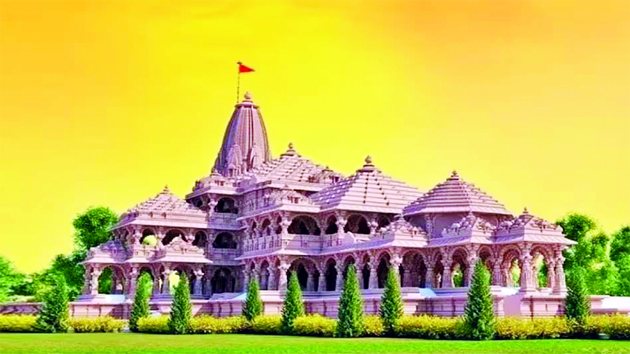Dr Puyesh Kant Sharma
Since the end of First World War, the world is witnessing the trend of surge in nationalism and consolidation of nation-state where cultural identity often competes with constitutional identity. Movements for identity politics became more significant in various parts of globe in twentieth century. It was in Germany during the regime of Hitler in 1930s, Buddhist movement in Tibet in 1950s, secular Iran turned into theological state in 1979, reestablishment of Greek Orthodox Church in Russia in post-Cold War Era, Islamic surge in Turkey and Pakistan and presence of theological nations in various West Asian states. This was the global challenge for India during the resolution of Ram temple and Babri Mosque dispute in the Court of law since 1949. The question was how to balance the legal consciousness with social consciousness which usually lack consensus and are in confrontation to each other.
Ram temple in Ayodhya represents civilizational heritage which has observed an attempt to destroy it in 1529 by Mir Baqi, Commander of Babur. It was revealed after the excavation survey by Archeological survey of India which suggested presence of Hindu structure beneath. The legal battle for the restoration of Ram temple in Ayodhya started in 1885 when Mahant Raghubir Das filed the suit twice in the matter seeking permission to build temple on land adjoining the Babri Mosque but was denied. However, it was in December 1949, Government of India declared the site of Babri Mosque as ‘contested area’. Since then battle was fought in the court of law for almost seventy years till five judges Constitutional bench of Supreme Court of India ordered the Government of India to create a trust to construct Ram temple in Ayodhya and allotted 5 acrs of land to Uttar Pradesh Sunni Central Waqf Board for the construction of Mosque.
Upholding the sanctity of this civilizational heritage is in consonance with Indian perspective of secularism. In this, state makes a positive intervention in religious affairs to ensure social welfare, public order and the protection of fundamental rights. It is influenced by its religious diversity, pluralistic traditions and efforts to address historical religious tensions. In addition, it seeks to address historical and social injustices and prevent discrimination based on religion. The judgement of the Supreme Court of India has taken due attention of secular credentials of the constitution. It went through all legal pursuits of justice be it the District Court, High Court, Supreme Court and finally in the Supreme court it moved from three judges constitutional bench to five judges bench. The final judgement was welcomed and accepted by both the Hindus and Muslim groups.
The resolution of Ram temple and Babri Mosque dispute in the Court of law and construction of Ram temple and Mosque depicts the balance of cultural nationalism vis-a-viz constitutional nationalism in India which draws its justification from civilizational heritage. This nationalism plays a significant role in shaping the collective identity of India as a nation. A diverse country like India and in the midst of phenomenon like globalization, this cultural nationalism recognizes the importance of cultural assimilation or heterogenization of Indian state-nation.
As state-nation, Indian state encompasses and recognizes different primordial identities, multiple nations several distinct cultural, linguistic and ethnic groups coexisting within India. India is a state-nation in contrast to nation-state is a process to stabilize cultural nationalism through constitutional nationalism. The verdict of the Honorable Supreme Court of India has balanced the cultural nationalism with constitutional mechanism. This remarkable verdict has very few parallels in history throughout the globe where the dispute which was lingered for many centuries was resolved amicably and without any bloodshed. It happened because of the adherence of secular, multi-cultural, democratic and liberal values rooted in the historical foundations of India.
(The author is Assistant Professor in Political Science GDC Ramnagar)


